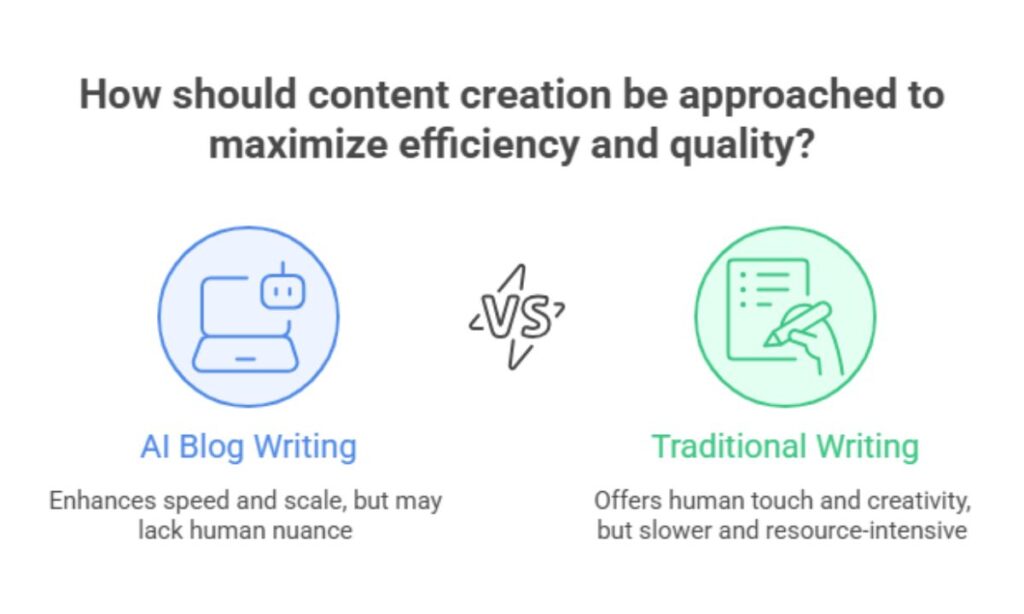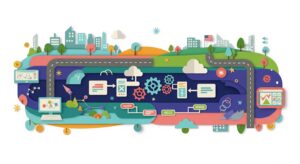The digital content landscape is experiencing a profound transformation. AI blog writing has evolved from experimental technology to an essential tool, revolutionizing content creation. From small businesses to major publications, content creators are discovering that artificial intelligence blog writers offer capabilities that complement human creativity. This technology isn’t just changing how we write, it’s redefining the entire publishing ecosystem.
How ai blog writing is changing digital publishing

What defines an artificial intelligence blog writer today
Today’s AI blog writing tools represent a major advance from basic spelling and grammar checkers. These systems use natural language processing to analyze trends, understand context, and generate engaging text. The technology has advanced to creating credible facsimiles of human-written content, despite occasional errors.
Modern artificial intelligence blog writers can craft complete articles, suggest improvements, and optimize for search engines while maintaining a conversational tone. Their ability to learn and improve over time is remarkable, with each iteration becoming more nuanced in understanding language and audience preferences.
What makes these tools truly revolutionary is how quickly they’re evolving. The speed of machine learning suggests that AI writing capabilities will only get better, creating both excitement and concern among professional writers.
How blog content automation improves speed and scale
AI blog writing dramatically improves content production efficiency. What once took days now takes minutes, allowing teams to generate multiple blog posts simultaneously without burnout. By using these tools, creators maintain a consistent publishing schedule with high-quality content.
This speed enables more strategic content deployment. Blog content automation also allows scaling operations without proportionally increasing resources, democratizing access to high-quality content creation and letting businesses of all sizes compete effectively.
Just consider these benefits:
- Produce 10x more content with the same team size
- Maintain consistent publishing schedules without writer fatigue
- Quickly adapt to trending topics and time-sensitive opportunities
- Scale content operations without proportional budget increases
How businesses use ai for ‘meaningful content’
Businesses aren’t just using AI for filler content. They’re leveraging these tools to create valuable material that serves specific purposes. The best implementations use AI as a collaborative partner rather than a replacement for human insight.
Companies find that AI blog writing tools excel at transforming complex data into accessible content, explaining technical concepts and translating specialized knowledge. Beyond creation, AI analyzes content patterns and audience behaviors to refine future strategies, helping companies create material that genuinely resonates while supporting broader business goals.
How ai blog writers reshape roles for human creators
The Human Creator as Editor-in-Chief
As AI handles routine writing tasks, human creators are evolving into strategic content directors. This new role resembles a traditional editor-in-chief, overseeing direction, quality standards, and brand alignment rather than producing every word.
Human creators now focus on higher-level decisions: Which topics deserve coverage? What perspective offers unique value? How does each piece fit into the larger content ecosystem? These strategic considerations remain firmly in human hands, with AI serving as an implementation tool.
This shift creates space for greater creativity and strategic thinking. No longer bogged down by routine content production, humans can concentrate on innovative approaches that differentiate their content in an increasingly crowded digital space.
This new role is about adding the essential ingredients that AI can’t produce
While AI excels at generating text based on patterns, it lacks certain qualities that only humans provide. Human creators serve as guardians of brand voice, ensuring all content maintains authentic connection with the audience.
Humans contribute firsthand experiences, unique case studies, and original data that large language models can’t generate. Most importantly, they make final decisions about publication, structure, and strategic alignment, ensuring each piece serves specific business objectives within the overall content strategy.
These uniquely human contributions include:
- Unique Voice: Maintaining brand authenticity and relatable tone
- Original Insights: Providing firsthand expertise and unique perspectives
- Strategic Direction: Aligning content with business goals and audience needs
How writers stay relevant with ai collaboration
The relationship between writers and AI is evolving from competition to collaboration. Surveys show that while 77% of marketers use AI for research and planning SEO content, 60% still trust human input for the main content. [Gravity Write]
Writers add value by focusing on aspects AI can’t replicate, genuine emotion, deep understanding, and authentic connection. “Writing is more than just putting words together. It’s about sharing ideas in a way that feels real and true.”
Forward-thinking writers are developing AI literacy, positioning themselves as content orchestrators who deliver the best of both human and machine capabilities. Rather than resisting change, they’re learning to craft effective prompts, edit AI-generated content, and blend machine efficiency with human creativity.
Where the future of blogging is going with ai tools
The End of the “One-Person-Show”
The traditional blogger archetype, a single person handling everything, is fading. AI blog writing tools are creating a new paradigm where content creation becomes more collaborative and specialized.
This shift mirrors evolution in other creative industries. Just as film evolved from solo creators to specialized teams, blogging is becoming a multi-faceted process with AI handling certain components while humans focus on others. Tomorrow’s successful bloggers will be measured by how effectively they orchestrate various tools and collaborators to create compelling content.
Changing Role from Content Creator to Content Director
As AI tools advance, human bloggers are transitioning from creators to directors. This new role involves generating original insights where value comes from unique perspectives rather than basic information. Human directors build authority through firsthand expertise and credibility that AI can’t replicate.
The skill of transforming rough AI-generated drafts into polished, insightful content is increasingly valuable. Content directors excel at:
- Identifying what’s worth keeping, enhancing, or replacing
- Adding unique perspectives that differentiate content
- Building trust through authentic expertise and experience
- Guiding AI tools with effective prompts and feedback
This evolution demands new skills, guiding AI effectively, recognizing quality, and adding the human elements readers crave.
Which blogging platforms are leading blog content automation
Several platforms are emerging as frontrunners in integrating AI capabilities. WordPress, through plugins like Jetpack AI, brings content automation to millions of websites. Medium has introduced AI-assisted features while maintaining focus on human creativity.
Specialized platforms like Rayo offer standalone solutions, while established CMS providers like HubSpot and Contentful are incorporating AI writing assistants into their workflows. The most innovative platforms create comprehensive ecosystems supporting the entire content lifecycle, from ideation to distribution. As competition intensifies, we’ll see increasingly sophisticated AI features becoming standard across blogging platforms.
Conclusion
AI blog writing represents a transformative force in digital publishing, redefining the entire ecosystem of online communication. As artificial intelligence blog writers become more sophisticated, they’re creating new opportunities for reaching audiences at unprecedented scale.
The future belongs to those who embrace this change strategically, finding the perfect balance between machine efficiency and human creativity. For content teams and individual bloggers alike, the question isn’t whether to adopt AI writing tools, but how to integrate them thoughtfully while preserving the uniquely human elements that truly connect with readers. The future of blogging isn’t about choosing between human or machine, it’s about creating something greater than either could achieve alone.
FAQs
What are the pros and cons of using ai blog writing tools?
Pros: AI writing tools increase production speed, ensure consistency, eliminate writer’s block, and allow for scaling without proportional resource increases.
Cons: AI-generated content may lack originality and authentic voice without proper guidance. There are potential issues with factual accuracy and the risk of generic-feeling content that doesn’t align with brand values.
How can ai support SEO in future of blogging?
AI is revolutionizing SEO by analyzing data to identify trending topics and keyword opportunities. Future tools will likely predict algorithm changes, allowing proactive content adjustments. AI will increasingly focus on user intent mapping, understanding not just what people search for but why. This capability will help create content that genuinely answers user questions while enabling sophisticated personalization for different audience segments.
Are artificial intelligence blog writers reliable for niche topics?
Reliability for niche topics depends on available training data and human guidance. In mainstream areas, AI performs well, but in specialized fields, it requires more oversight. The most effective approach combines AI efficiency with human expertise, letting AI handle structure and basic content while humans verify accuracy and add specialized insights.
What is the impact of blog content automation on freelance writers?
Blog content automation is reshaping the freelance writing landscape. Writers focusing solely on basic content face increasing competition from AI. However, new opportunities are emerging for those who adapt. Many freelancers are evolving into content strategists, AI prompt engineers, or specialized editors, roles that command higher rates than traditional writing. The key to thriving lies in moving from basic content creation to content direction and strategy.
How does ai-generated content affect trust and authenticity?
The impact on trust depends largely on implementation and transparency. When AI amplifies human expertise rather than replaces it, authenticity can be enhanced. Problems arise when businesses pass off purely AI-generated content as human-created. The most trusted approaches involve transparent use of AI as part of a human-directed process, maintaining audience trust by showing that AI tools help human experts communicate more effectively.

Ridam Khare is an SEO strategist with 7+ years of experience specializing in AI-driven content creation. He helps businesses scale high-quality blogs that rank, engage, and convert.



